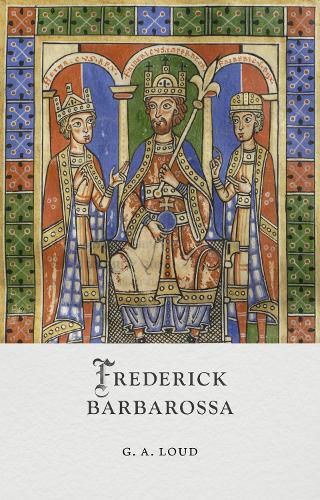Readings Newsletter
Become a Readings Member to make your shopping experience even easier.
Sign in or sign up for free!
You’re not far away from qualifying for FREE standard shipping within Australia
You’ve qualified for FREE standard shipping within Australia
The cart is loading…






Frederick Barbarossa, also known as Frederick I, Holy Roman Emperor from 1155, was a dominant figure in late 12th-century European history.
He is remembered as one of the greatest medieval German emperors; some even regard him as a German hero. He brought peace to Germany, fought to maintain control over Italian cities and engaged in a lengthy dispute with the papacy. Barbarossa died on a Crusade to reclaim the Holy Land for Christianity. But despite his efforts, his reign marked a decline in imperial authority, with defeats in Italy and growing local power among German princes. Frederick Barbarossa examines this paradox, revealing the realities and limitations of monarchical power in medieval Europe. This is a cogent, original and up-to-date analysis of Barbarossa, suitable for both students and the general reader.
'An excellent overview, showing in a nuanced but accessible way how Barbarossa's personality and ambitions interacted with the structures of power and government available to him in Germany and Italy. It off ers vivid insights into both the scope and the limitations of a medieval monarch's power to act and to rule.' Len Scales, Professor of Late Medieval History, Durham University
$9.00 standard shipping within Australia
FREE standard shipping within Australia for orders over $100.00
Express & International shipping calculated at checkout
Frederick Barbarossa, also known as Frederick I, Holy Roman Emperor from 1155, was a dominant figure in late 12th-century European history.
He is remembered as one of the greatest medieval German emperors; some even regard him as a German hero. He brought peace to Germany, fought to maintain control over Italian cities and engaged in a lengthy dispute with the papacy. Barbarossa died on a Crusade to reclaim the Holy Land for Christianity. But despite his efforts, his reign marked a decline in imperial authority, with defeats in Italy and growing local power among German princes. Frederick Barbarossa examines this paradox, revealing the realities and limitations of monarchical power in medieval Europe. This is a cogent, original and up-to-date analysis of Barbarossa, suitable for both students and the general reader.
'An excellent overview, showing in a nuanced but accessible way how Barbarossa's personality and ambitions interacted with the structures of power and government available to him in Germany and Italy. It off ers vivid insights into both the scope and the limitations of a medieval monarch's power to act and to rule.' Len Scales, Professor of Late Medieval History, Durham University